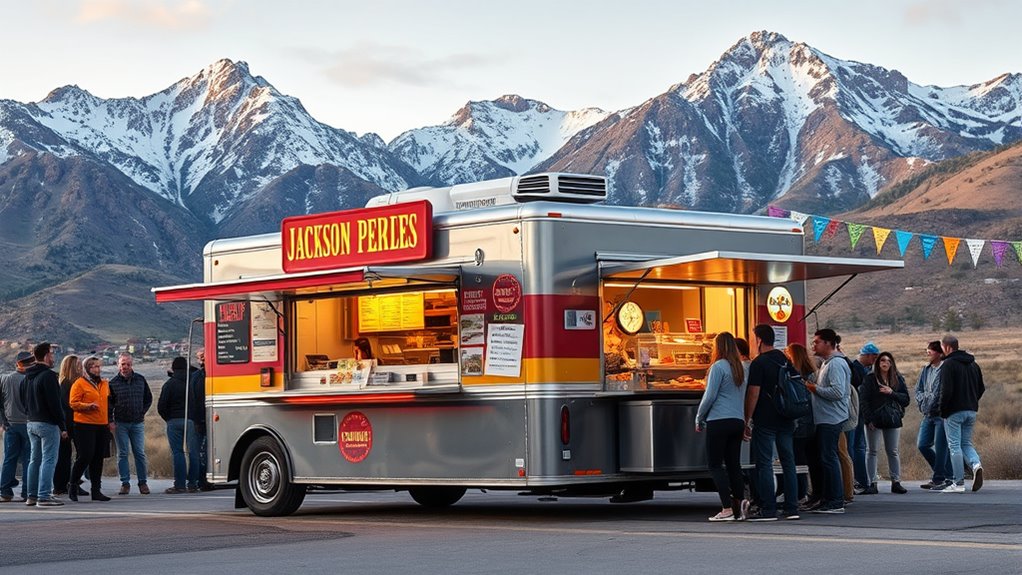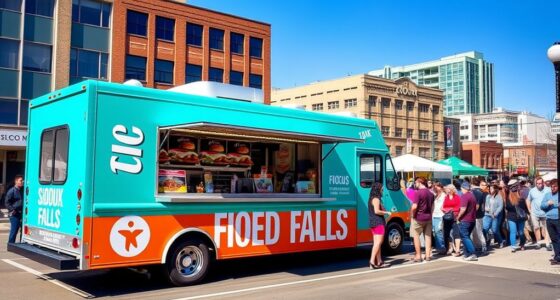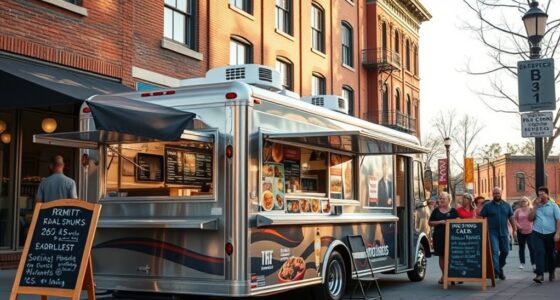To start your food truck in Jackson, Wyoming, you’ll need permits like a town business license, special event, and expositions permits, plus safety inspections for fire and LPG systems. Costs vary, with fees around $1,599 for permits and about $125 annually for fire inspections. Find prime spots—public events, private properties, or local festivals—and plan your menu to meet safety standards. smart marketing through local partners boosts visibility—continue to build your knowledge for a successful launch.
Key Takeaways
- Obtain necessary permits including business licenses, event permits, and safety inspections to operate legally in Jackson, Wyoming.
- Budget for costs such as licenses, safety equipment, permits, location fees, and maintenance to ensure financial readiness.
- Secure prime locations like festivals, parks, or private properties by coordinating with event organizers and adhering to local regulations.
- Plan a compliant menu with proper documentation, safety procedures, and necessary approvals for hazardous foods and equipment.
- Develop marketing strategies through partnerships with local events, breweries, hotels, and community involvement to attract customers.
Navigating Local Permits and Licenses
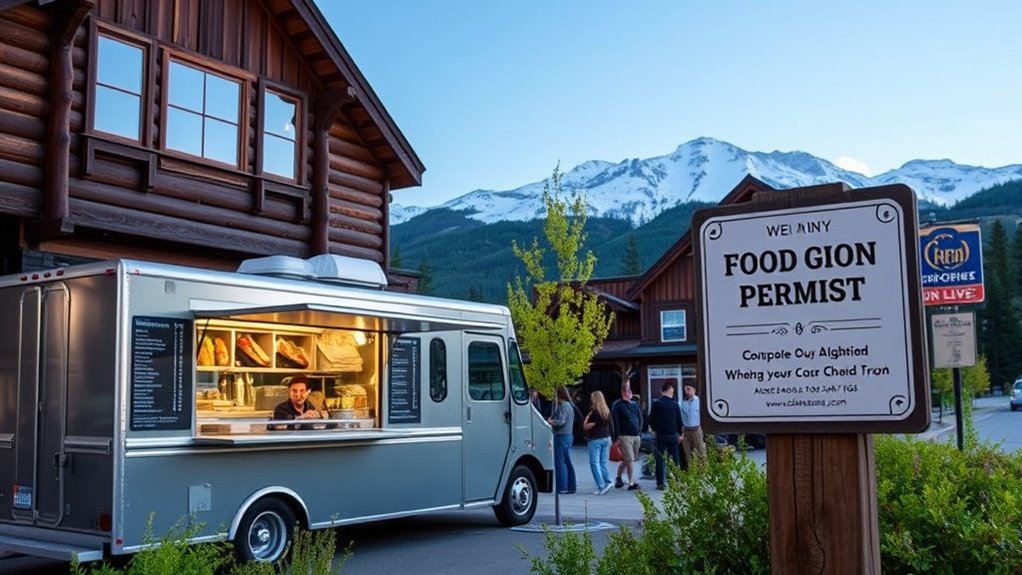
Charting local permits and licenses is a crucial first step for operating a food truck in Jackson, Wyoming. You’ll need a town merchant business license, which is mandatory for any business within town limits, though contractors with existing licenses are exempt. If you plan to sell on private property, an Exposition Permit is required, especially for multi-vendor events, which can involve significant fees—sometimes over $1,500. Operating on public property demands a Special Event Permit, and both permits might be needed if you use different locations. You’re allowed up to eight days annually as a temporary merchant, with no more than four consecutive days on private property. The “Mondays in May” event is an example of a special event that requires a permit, ensuring compliance with these permits early helps avoid costly delays and keeps your food truck legally ready to serve Jackson’s visitors. Understanding local regulations is essential to avoid potential legal issues and fines.
Understanding Regulatory Operating Windows
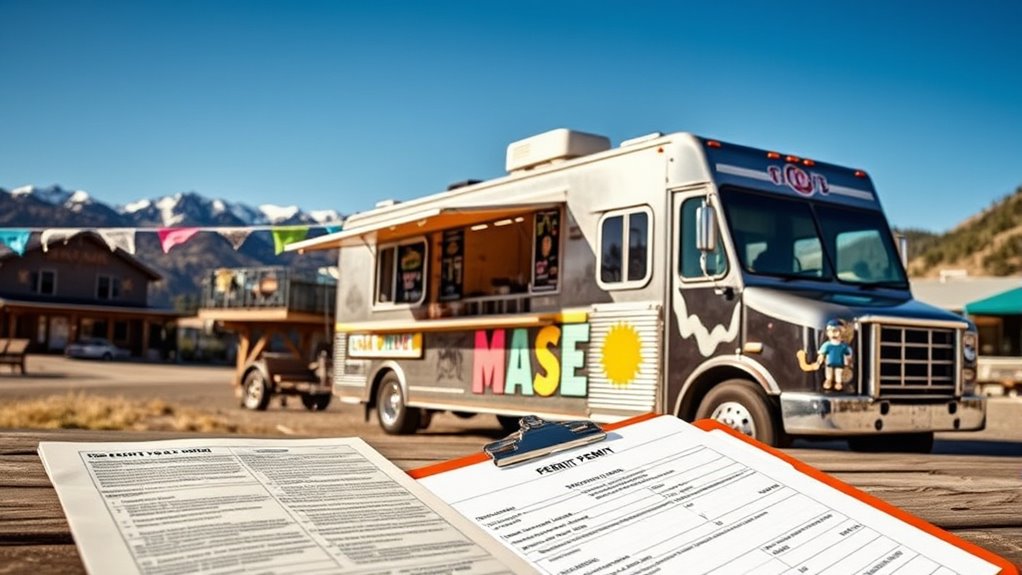
Understanding the rules around operating windows helps you avoid fines or shutdowns. Local ordinances often set specific hours, which can vary by season or event, so you need to stay informed. Knowing these limits guarantees you serve customers safely while staying compliant with Jackson’s regulations. Additionally, understanding the Bedroom subtopics related to ambiance, design, and decor can inspire a cozy and authentic environment for visitors or staff.
Municipal Operation Limits
Municipal operation limits in Jackson restrict food trucks to specific time frames and locations, ensuring compliance with local regulations. You can only operate during approved special events or within strict private property limits—up to 8 days annually, with no more than 4 consecutive days, without special permits. Outside these windows, trucks must remain dormant. Operating hours are defined by event permits, which specify exact times, and deviation risks fines or suspension. The following table illustrates these constraints:
| Location | Allowed Operation | Time Limit |
|---|---|---|
| Town boundaries | Special events & private property | Up to 8 days/year, 4 consecutive |
| Private property | Limited transient sales | 4 days without permits |
| Town public property | Special event permits | As specified by event |
| County jurisdiction | Mobile food trucks | Subject to separate codes |
| Storage zones | Storage & equipment rules | Varies, some zones prohibit outdoor storage |
Compliance is essential to avoid penalties. Adhering to regulations is crucial for sustainable operation.
Seasonal & Event Timing
Seasonal and event timing considerably impacts food truck operations in Jackson, as local regulations restrict vending to specific windows aligned with high-demand periods and approved events. During summer (late June–early September), demand peaks due to increased tourist activity and outdoor events, making it the prime season for success. Shoulder seasons in spring and fall see moderate, variable traffic linked to special events and holiday weekends. Winter months bring lower demand, as tourism shifts toward ski resorts, and outdoor events slow or stop altogether. Regulatory constraints further limit operations: permits are required for each event, and vending on town streets is only allowed at approved gatherings. Planning your season involves factoring in permit lead times, inspection schedules, and coordinating with event organizers to maximize operational windows. Additionally, understanding the local regulations and timing for permit approvals can help ensure your truck is ready to operate during peak periods and avoid unexpected delays.
Ensuring Safety and Inspection Compliance
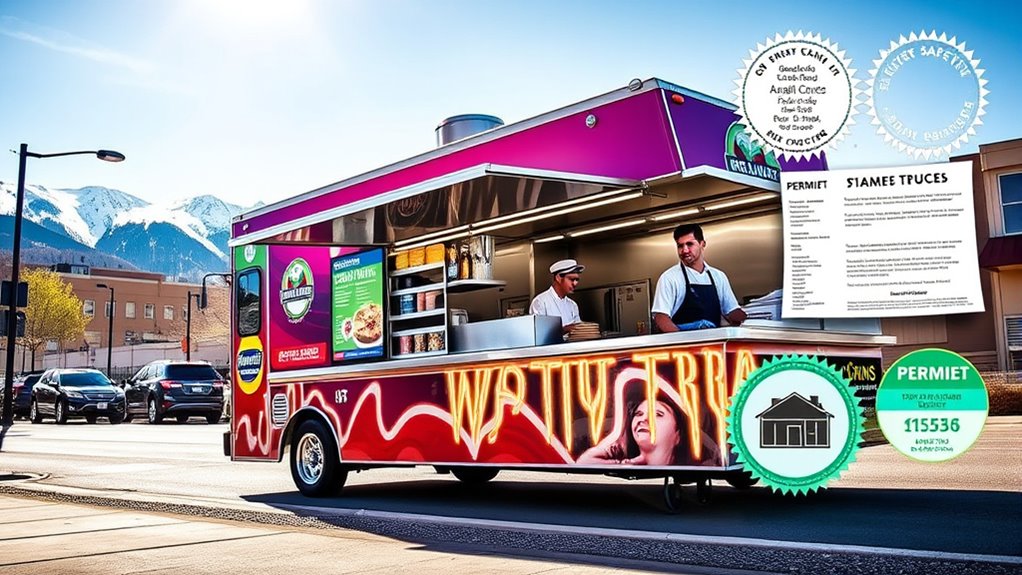
Ensuring safety and inspection compliance for food trucks in Jackson requires diligent adherence to local regulations and proactive maintenance. You must register your vehicle and pass annual inspections enforced by Jackson Hole Fire/EMS, following the International Fire Code. Fire safety equipment, like Class K and ABC fire extinguishers, must be on hand and regularly serviced, with hydrostatic testing records kept current. LPG gas alarms are mandatory for vehicles with propane systems, and exhaust hoods need NFPA 96 cleaning based on your cooking operations. Staff should be trained in fire safety basics and proper use of suppression systems. Additionally, maintaining detailed records of inspections, certifications, and servicing helps you stay prepared for surprise inspections and ensures ongoing compliance with fire and health standards. Regularly reviewing local regulations is essential to stay updated on any changes that could affect your compliance status. Staying informed about fire safety standards and updates can help prevent violations and ensure your operation remains compliant.
Managing Costs and Fees for Your Food Truck Venture
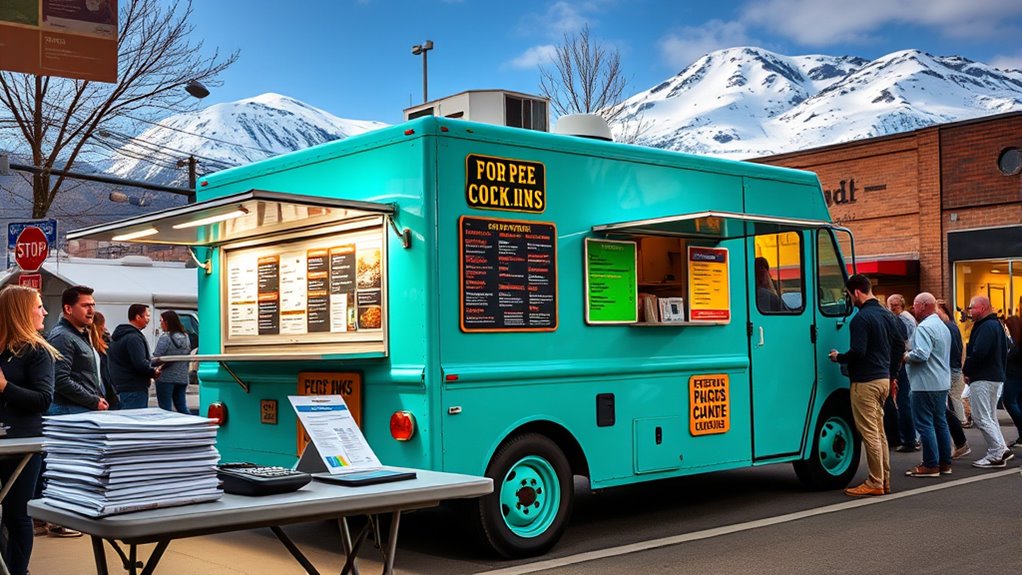
Managing costs and fees is essential to keeping your food truck profitable in Jackson. You’ll need to budget for licensing, permits, and safety inspections, which can vary widely depending on your location and operations. Additionally, event and location fees can add up, so planning for these expenses helps make certain of steady cash flow and long-term success. Understanding local regulations and permit costs can significantly impact your overall expenses and planning process. It’s also important to account for ongoing expenses such as maintenance, supplies, and fuel, which are integral to managing your budget effectively.
Licensing and Permit Expenses
Managing licensing and permit expenses is a critical step in launching your food truck in Jackson, Wyoming, as these costs can substantially impact your startup budget and ongoing operations. You’ll need a town merchant business license, with fees varying by business, and an exposition license if operating on public property, which can cost around $1,599. Special event permits are required for temporary or public space sales, with activity limits on private property. At the county level, you’ll register your mobile food vehicle and schedule annual inspections through Teton County Fire/EMS. Startup costs include application fees, vehicle registration, zoning reviews, and health department plan reviews. These expenses are indispensable to ensure compliance and avoid costly penalties, so plan your budget accordingly. Additionally, understanding electric bike horsepower can help you evaluate the performance features of different electric vehicle models, which may be relevant if you plan to incorporate electric bikes for transportation or delivery purposes in your operations.
Inspection and Safety Fees
Inspection and safety fees are crucial costs to budget for when operating a food truck in Jackson, Wyoming. You’ll need to schedule annual fire inspections through local fire or EMS offices, often costing around $125 per truck. These inspections verify that your onboard fire extinguishers, automatic suppression systems, and LPG gas alarms meet IFC standards. Failing inspection can delay licensing and event participation, leading to re-inspection fees and downtime. Additionally, the health department requires annual or pre-opening inspections, with fees varying by jurisdiction and risk level. You must also maintain and certify safety systems, including hood suppression and LPG inspections, which add recurring costs. Proper recordkeeping of these inspections is essential for compliance and avoiding penalties, ensuring your truck stays safe and operational. Monitoring trust issues with your team or partners can help prevent misunderstandings that might impact safety or operations.
Event and Location Costs
Understanding the costs associated with event permits, private property rentals, and festival participation is essential for keeping your food truck profitable in Jackson. Event permit fees vary depending on the type and duration of the event, with town-run series charging around $1,599 per event. Special-event permits are required for operating on public property, and costs depend on the event specifics. Private property rentals, like parking lots or curated vendor spaces, typically range from $250 to $1,000 per month, with prime locations demanding higher rates. Festival booth fees can range from under $100 to several hundred dollars daily, plus additional expenses for utilities, insurance, and waste removal. Recurring costs like storage, fuel, and maintenance also impact your budget, making careful planning fundamental. Permit fees can also increase if additional services such as electricity, water, or sanitation are required during the event. Properly managing maintenance costs is crucial for long-term profitability and operational efficiency.
Finding Prime Locations and Event Opportunities
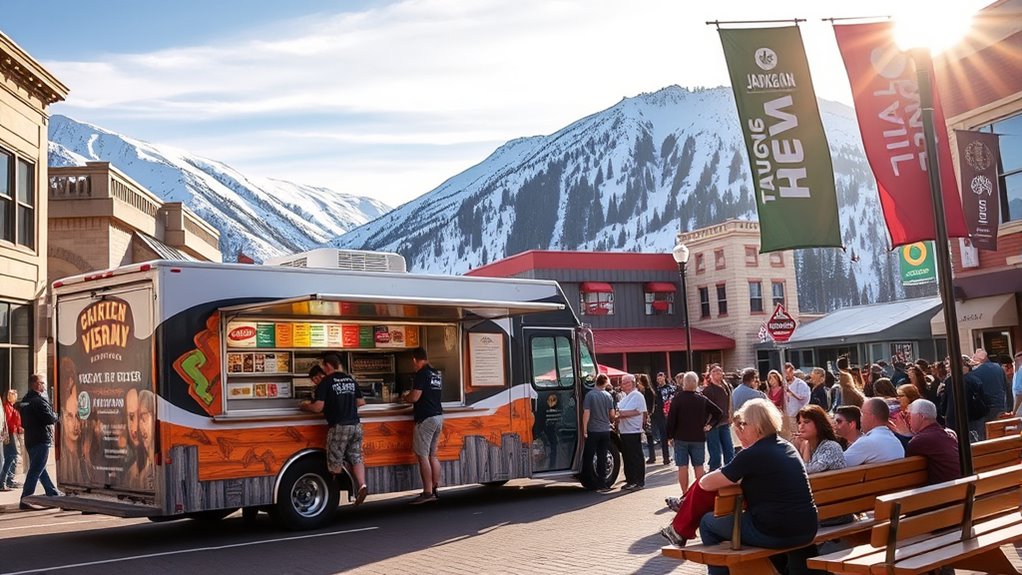
Identifying the best locations for your food truck in Jackson requires strategic planning, especially given the city’s zoning rules and event restrictions. Downtown Town Square draws high foot traffic during summer weekends and festivals, but vending is limited to special events or private property with permits. Parks like May Park and Cottonwood Park host organized food truck series and neighborhood gatherings, requiring special event permits. Trailheads and parking lots near Grand Teton see seasonal visitor turnover, with county regulations applying. Private lots allow transient merchant activity up to eight days per year without special permits, but longer operations need licenses. Event venues and fairgrounds attract large crowds, yet require approval from organizers and permits. Zoning regulations can impact where and when you can operate, so understanding local ordinances is essential. Aligning your location with seasonal peaks maximizes visibility and sales potential.
Planning a Menu That Meets Local Standards
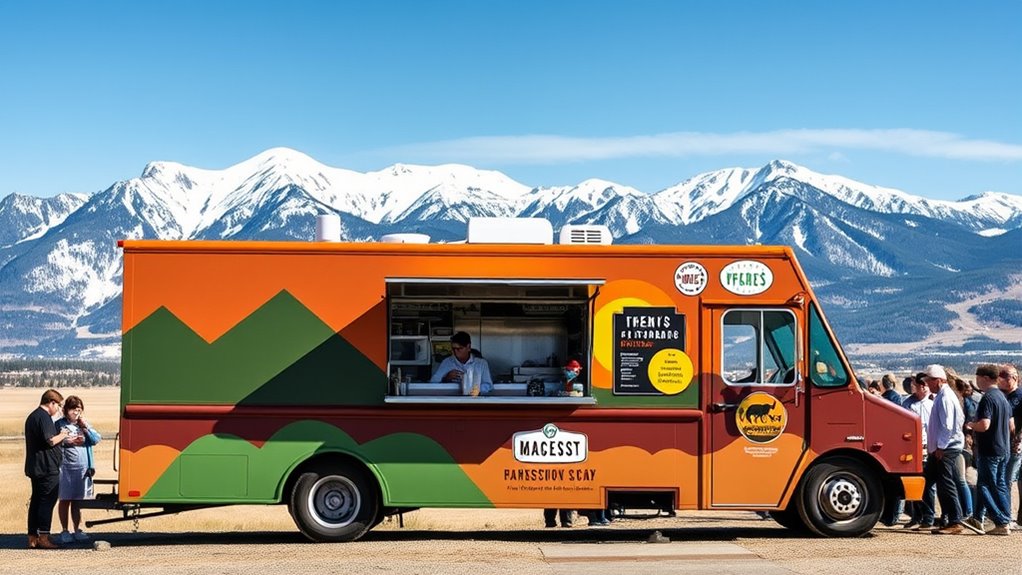
To guarantee your food truck operates smoothly in Jackson, you need to develop a menu that complies with local health and safety standards. Confirm your menu matches the approved Mobile Food Preparation Vehicle Checklist and the items listed on your vendor application for inspections. If you plan to serve potentially hazardous foods, document all cooking, cooling, holding, and reheating procedures per Environmental Health guidelines. Avoid or clearly label items prohibited by laws or event rules, and follow liquor licensing rules for alcoholic beverages. Any menu changes might require re-inspection or prior approval from Teton County Environmental Health. Additionally, your menu choices must adhere to fire, fuel, and equipment constraints, such as proper ventilation, fire extinguisher requirements, and safe electrical setups, all ensuring compliance with local codes. Incorporating law of attraction principles can help you visualize and manifest a successful menu that resonates with your target customers.
Marketing Strategies to Attract Customers in Jackson
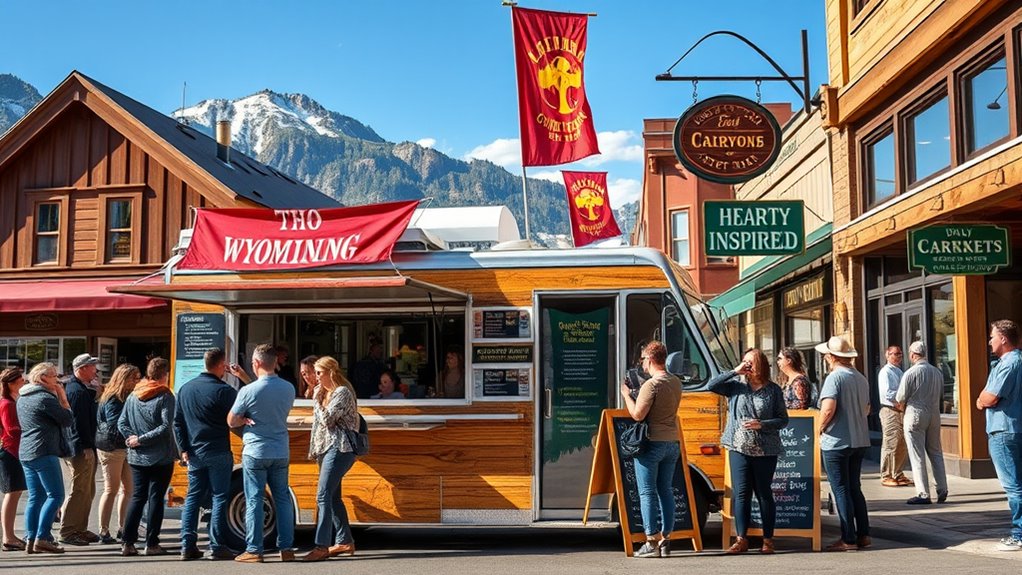
Partnering with local events and businesses is a powerful way to attract customers to your food truck in Jackson. You can secure high-footfall placements by participating in annual events like Rendezvous, Elk Fest, and farmers markets, with event-specific permits. Establish ongoing collaborations with parks or organizers, such as “Mondays in May,” to create predictable schedules that encourage repeat visits. Cross-promote with local breweries, ski shops, and galleries for co-hosted nights or bundled discounts, tapping into their customer bases. Contract with hotels, tour operators, and outfitters to serve tourists during peak seasons. Additionally, participating in community fundraisers and charity events boosts your brand’s profile and demonstrates your commitment to the local community, helping you stand out amidst competition. Leveraging local events can significantly increase visibility and customer loyalty by tapping into established audiences.
Frequently Asked Questions
Can I Operate a Food Truck Year-Round in Jackson Outside Special Events?
You can’t operate a food truck year-round in Jackson outside of special events. The town’s rules prohibit ongoing daily business within town limits unless at approved events or on private property with specific permits. Even then, you must meet fire safety and zoning requirements. Outside town limits, you might find more flexibility, but you’ll still need to comply with county regulations, inspections, and seasonal considerations that could impact your year-round operation plans.
What Are the Specific Zoning Restrictions for Outdoor Storage of Trucks on Private Property?
Picture your food truck parked proudly on your private property, shining like a beacon of culinary delight. Now, imagine the zoning restrictions that could turn that dream into a nightmare—certain zones disallow outdoor storage altogether, while others demand setbacks beyond your reach. You must verify with the Planning Department, confirm your zone permits outdoor storage, and get property-owner consent. Without these, your food truck could be forced to vanish like a puff of smoke.
Are There Any Restrictions on the Types of Cuisine or Menu Items Permitted?
You need to follow local health regulations, which set restrictions on your menu items. Hazardous foods requiring special handling, like raw shellfish or undercooked meats, may need posted warnings or be restricted. Certain processes, such as smoking meats or preparing high-risk foods off-site, require additional permits. Also, your menu must comply with fire and safety codes, especially if you use open flames or LPG equipment. Always check with health and fire authorities for specific restrictions.
How Early Must I Apply for Permits Before Participating in a Town-Sanctioned Event?
You should apply for permits at least 4 to 8 weeks before participating in a town-sanctioned event. This allows enough time for processing health, fire, and county permits, as well as insurance and licensing requirements. Submitting your application early helps avoid delays, guarantees compliance, and makes certain you meet all deadlines for supporting documents like insurance certificates, fire inspections, and license approvals, so you’re ready to serve at the event.
Is There Support Available for New Vendors Navigating the Permitting Process?
Finding permits can feel like locating a needle in a haystack, but support is readily available. You can have a guiding hand from local municipal staff who offer pre-application conversations and zoning checks. Fire/EMS also provides guidance and inspection scheduling help. Established vendors and seasonal operators are happy to share their wisdom, acting as informal mentors. Reach out early, ask questions, and they’ll help you clear hurdles before they become roadblocks.
Conclusion
Starting your food truck in Jackson, WY, takes effort, but it’s worth the climb. By steering permits, choosing the right spots, and crafting a menu that resonates, you’re setting yourself up for success. Remember, the early bird catches the worm, so plan ahead and stay flexible. With the right mindset and preparation, you’ll turn your food truck dreams into a thriving reality—just keep your eyes on the prize and roll with the punches.
